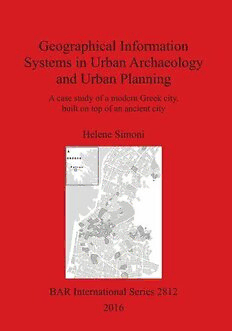
Geographical Information Systems in Urban Archaeology and Urban Planning: A case study of a modern Greek city, built on top of an ancient city PDF
84 Pages·2016·9.3 MB·English
Most books are stored in the elastic cloud where traffic is expensive. For this reason, we have a limit on daily download.
Preview Geographical Information Systems in Urban Archaeology and Urban Planning: A case study of a modern Greek city, built on top of an ancient city
Description:
The book focuses on the implications of discovering archaeological layers during construction works in modern cities for both urban archaeology and urban planning. The research methodology uses qualitative and quantitative data. Patras, Greece was selected as the case study.Archival research and existing unused data have contributed to the compilation of a database. G.I.S. and statistics are used to process it digitally, and to demonstrate the statistical relationship between data from urban planning and urban archaeology. This enables the prediction of the existence of antiquities and their depth by recording and processing data from five years of excavations, without considering the city's history.The procedure highlights the importance of a city's archaeology for its functioning and proposes the introduction of a new building regulation. This study can be used in the monitoring of construction and the investigation of the role of cultural heritage in the planning of the contemporary city.
See more
The list of books you might like
Most books are stored in the elastic cloud where traffic is expensive. For this reason, we have a limit on daily download.
